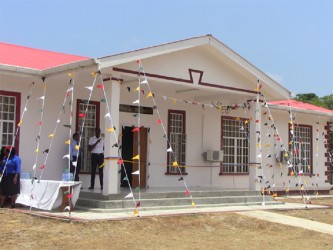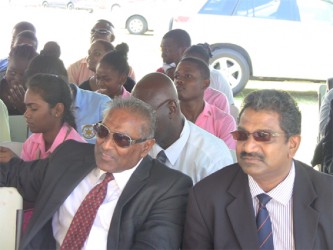A multi-million dollar Mediation Centre was commissioned on Friday in the compound of the High Court in Berbice and when it becomes operational in a few days time, Berbicians will have the option of seeking a certified mediator to resolve conflicts rather than having their case tried in court.
The decision agreed upon by both parties will be legally binding as if the case was tried in a court of law, but will have the advantage of being expeditiously carried out. Moreover, it is anticipated that with the establishment of the facility the backlog of cases in the judiciary will be significantly reduced.
Before officially commissioning the centre, Chancellor of the Judiciary (ag) Justice Carl Singh said its establishment is the fulfillment of a promise he made to the Berbice community three years ago and he was pleased to see the promise being realised during his tenure. He noted that Berbice already has a “culture of settlement” so making use of the mediation centre rather than going to court should not be a hard adjustment. “It is that disposition, that culture of settlement; it is in that context, that I say the investment in this building is a worthy one,” he said.

Elaborating on the necessity of the centre, Justice Singh said, “we are simply overburdened by the number of cases that confront us in these courts; both at the level of the magistrates and at the level of the first instance judiciary.” He explained that the numbers of cases are greater than the judicial resources available to adjudicate in the matters, hence the sloth in the system.
He therefore urged Berbicians to make full use of mediation and to not allow the facility to become a white elephant. Justice Singh further charged the lawyers practicing in Berbice and the litigants themselves to sustain the centre, noting that the two present the greatest area of resistance to the success of the Mediation Centre.

“There is a fear amongst lawyers that mediation will impact on their pockets,” he stated. Trying to alleviate the fears of some lawyers, he advised “it becomes a matter of the initial discussions that affect your retainer. You simply need to tell your clients upfront what your fee is whether the matter goes to mediation or plays out in court”.
Turning his attention to the litigants, Justice Singh said, persons have the tendency of wanting revenge in court and wanting to experience the satisfaction of having their lawyers rip their opponents apart in court. He opined that “80% of the cases that come to the courts, if not more, can be resolved.” Citing personal experiences, Justice Singh recalled that he “sat in these courts and people were squabbling over the position of a fence. Why do you have to come to court, to engage judicial resources and time” to resolve petty disputes.
In mediation there is a neutral third party, the mediator, whose sole responsibility is merely to guide the litigants toward the settlement which is acceptable to both sides.
The mediator is not a decision maker. When a matter is settled, the mediator draws up what is known as the ‘Terms of Settlement’ which is then verified by the legal representatives of the parties involved before being presented to a judge who deems the Terms of the Settlement an order of the court.
It was disclosed that Berbice has a pool of trained mediators in the person of lawyers and non-lawyers, if persons see it fit to take their conflict to mediation.
Attorney General Anil Nandlall was among several members of the judiciary including judges, magistrates and attorneys present for the official commissioning of the Mediation Centre.




